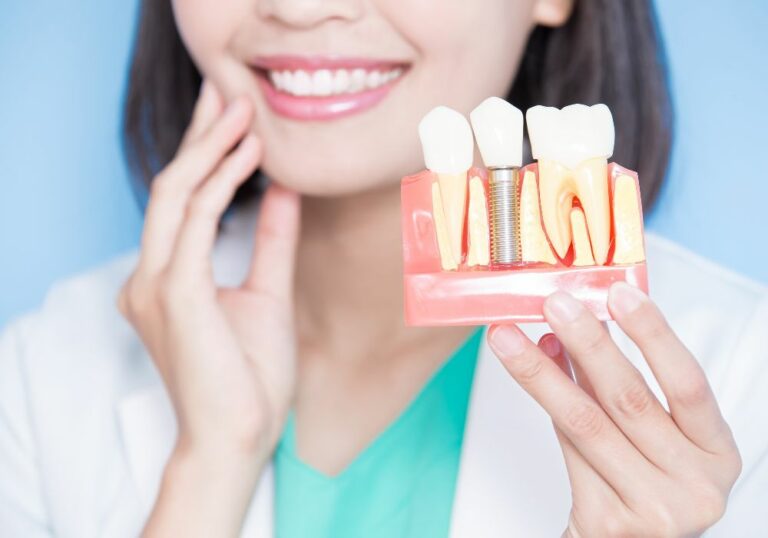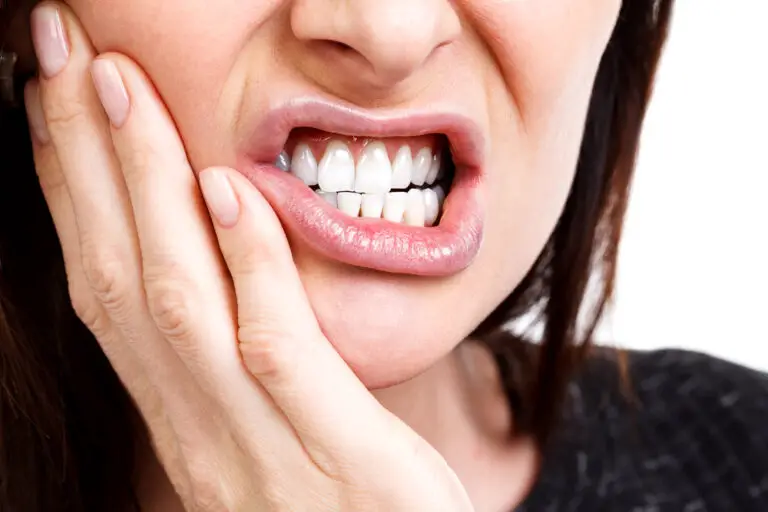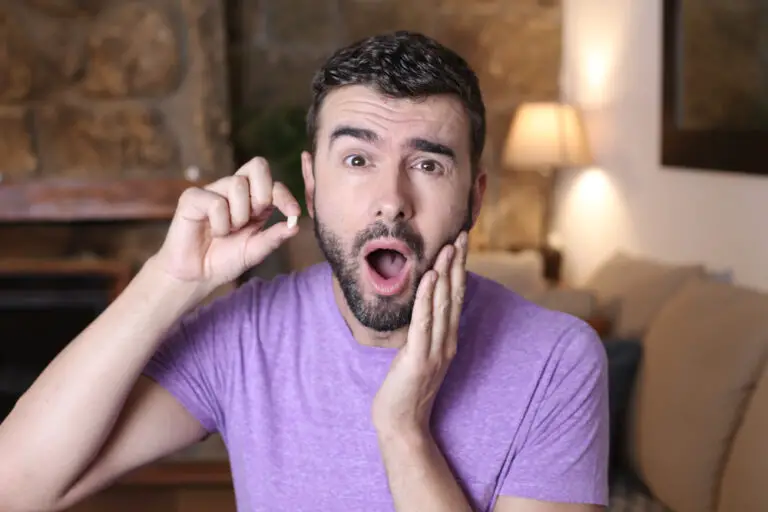What causes teeth grinding in dogs?
Teeth grinding, also known as bruxism, is quite common in dogs. There are a few possible causes for this behavior:
1. Pain or discomfort in the mouth
One of the most common reasons dogs grind their teeth is because of pain or discomfort in their mouth, face, or head region. Potential sources of this discomfort include:
- Dental problems – Fractured teeth, dental infections, and loose or damaged teeth can all cause mouth pain that leads to bruxism. Infections at the root of the tooth are a common cause of tooth pain.
- Oral inflammation and sores – Inflammation of the gums, ulcers or cuts on the gums or tongue, and abscesses around the teeth can make closing the mouth uncomfortable.
- Jaw injuries – Fractures, dislocations, or sprains of the jaw bones or joints can make chewing and closing the mouth very painful. This causes teeth grinding.
- TMJ disorders – The temporomandibular joints (TMJ) on each side of the jaw connect the lower jawbone to the skull. Disorders of these joints including arthritis, displacement, or dislocation of the disc can cause pain and grinding.
- Ear infections or problems – Due to the close proximity and nerve connections, ear infections and other ear issues like hematomas can manifest as mouth pain and discomfort that leads to bruxism.
- Sinus infections – Inflammation and infection of the sinus cavities surrounding the upper teeth can also be perceived as mouth pain and cause grinding. This is more common in brachycephalic (short-nosed) dog breeds.
- Neurological disorders – Some neurological conditions can cause painful nerve reactions in the mouth and face. For example, trigeminal neuralgia involves burning nerve pain that may worsen with chewing or closing the mouth, prompting teeth grinding.
In essence, dogs grind their teeth because the behavior seems to relieve pain and discomfort in their mouth when they close their jaws. The grinding may worsen when touching their muzzles or jaws. Many times the underlying cause is dental-related.
2. Stress, anxiety, and excitement
In addition to physical mouth pain, psychological and emotional factors can also prompt teeth grinding in dogs. Sources of stress, anxiety, or excitement that can lead to bruxism include:
- Separation anxiety – Dogs with separation anxiety will often grind their teeth when left alone as a way to relieve their stress.
- Phobias – Dogs with noise phobias, especially thunderstorm phobia, may grind their teeth during storms or fireworks due to anxiety.
- Travel stress – The stress and excitement of car rides or visiting new places can cause some dogs to anxiously grind their teeth.
- Social stress – Meeting new people, animals, or experiences can trigger stress-related bruxism in some anxious dogs.
- Vet visits – The anxiety of going to the veterinary clinic often causes teeth grinding during the appointment and waiting in the lobby.
- Training/work – Dogs grinding their teeth may be a sign of concentration, distraction, or mild stress during training sessions and canine “work.”
- New environments – Even happy excitement in a new environment can translate to anxious teeth grinding for some sensitive dogs.
Like humans, bruxism seems to be a way for dogs to self-soothe emotional and psychological stress by clenching their jaws. It can be an instinctive reaction to any high-stimulus situation good or bad.
3. Normal behavior
While tooth grinding can indicate an underlying physical or emotional issue, it’s also quite normal just as an everyday habit in some dogs. Reasons it may occur as a “normal” behaviour include:
- Breed tendency – Some breeds, especially brachycephalic breeds like Boxers, Bulldogs, and Boston Terriers, are prone to habitual grinding and jaw clenching simply due to their facial structure and alignment of teeth. What seems like problematic bruxism is often perfectly normal for that breed.
- Boredom – Dogs left alone for long periods with little stimulation may grind their teeth out of boredom or as an instinctive need to chew, similar to cribbing in horses. Providing more interactive toys and activities can help curb boredom grinding.
- Individual habit – Much like human nail-biting or pen-tapping habits, some dogs seem to develop teeth-grinding as a habit, hobby, or self-soothing behavior over time. There is no negative stimulus; they just like doing it.
So in summary, while grinding can be linked to medical issues, many dogs brux as just an everyday habitual behavior once it becomes ingrained. Unless it causes problems, this type of grinding is usually considered normal.
4. Less common causes
There are a few less common medical conditions that may prompt or exacerbate teeth grinding in dogs:
- Idiopathic epilepsy – Focal motor seizures originating in the brain’s motor cortex area can cause involuntary spasms of the jaw muscles leading to bruxism.
- Movement disorders – Diseases causing tremors, spasms, and tics like distemper and dyskinesia can also produce teeth grinding.
- Cognitive dysfunction syndrome – The canine version of dementia or Alzheimer’s can displace chewing and grinding behaviors.
- Nutritional deficiencies – Dogs with deficiencies in nutrients like calcium, magnesium, or B vitamins may chew and grind their teeth more.
- Gastrointestinal issues – Diseases of the GI tract causing nausea or acid reflux can lead to bruxism and cribbing behaviors.
- Organ dysfunction – Liver and kidney diseases are sometimes associated with increased teeth grinding, potentially due to toxin buildup or metabolic changes.
- Endocrine disorders – Diseases of the thyroid, adrenal glands, and pituitary gland like Cushing’s and hypothyroidism affect hormone regulation, which influences behaviors like bruxism.
- Medication side effects – Some drug classes like phenothiazines, amphetamines, and SSRIs may cause bruxism as a side effect.
- Genetic factors – A few gene mutations are linked to compulsive behaviors like obsessive teeth grinding in Dobermans and other breeds.
So in rare cases, bruxism may stem from systemic illness rather than a dental or psychological cause. Veterinary exams and testing help identify these less common medical factors.
Why does my dog grind his teeth specifically when I close his mouth?
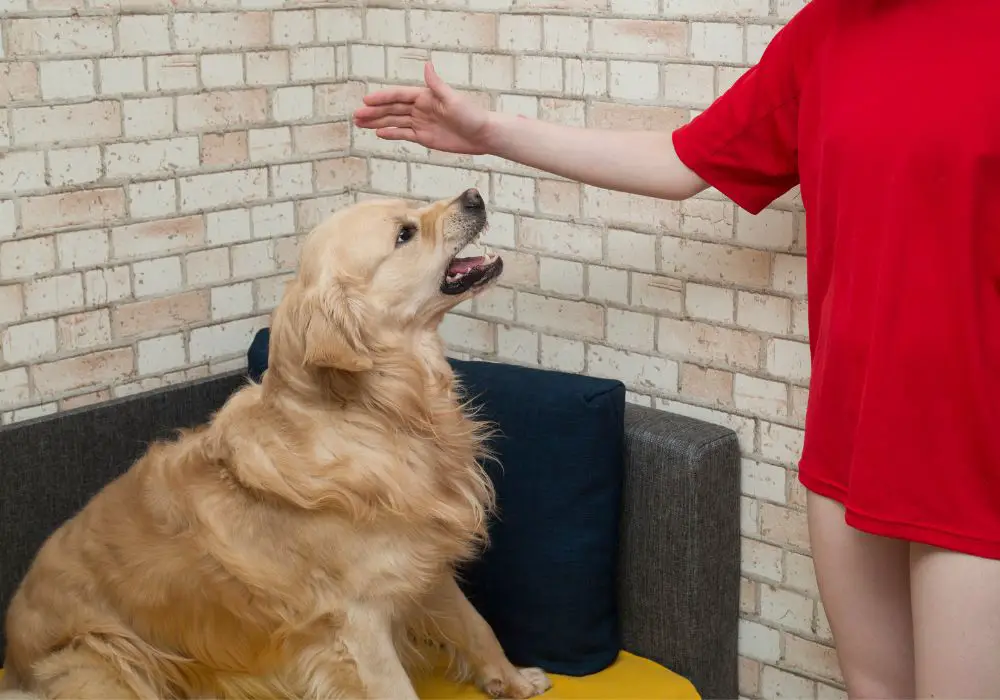
While the reasons above explain why dogs grind their teeth in general, you may notice your dog grinds his teeth specifically when you or the vet manually close his jaw. Reasons this occurs include:
Discomfort or pain from having the mouth closed
Having their mouths manually closed puts pressure on the jaw joints and teeth. If your dog has any underlying oral pain or discomfort as described earlier, this pressure can exacerbate those painful sensations and trigger teeth grinding.
Potential sources of mouth pain that get aggravated when the mouth is closed include fractured teeth, gum infections, temporomandibular joint issues, and nerve pain from conditions like trigeminal neuralgia. Even subtle sources of irritation may only cause noticeable discomfort when the dog’s mouth is actively held shut.
Resistance or anxiety about having the mouth handled
Some dogs simply don’t like having their mouths touched or manually closed. They find it unpleasant or scary when someone forces their jaws shut. Just like kids reflexively resisting vegetables, dogs may automatically resist or protest having their mouths closed by grinding their teeth.
Mouth handling anxiety is more common in dogs who are mouth shy due to past trauma or lack of conditioning. Fearful or easily stressed dogs are also prone to displaying teeth grinding or other stress signs when restrained or having their mouths touched against their wishes.
Habit from anticipating the mouth being closed
In some cases, the teeth grinding is not a reaction, but an ingrained anticipatory behavior. The dog has learned to expect having his mouth momentarily forced shut during exams or procedures.
So as soon as your hand approaches his muzzle, he automatically starts grinding his teeth even before you close his mouth. This becomes a conditioned response or habit over time.
Seeking social attention or food rewards
Dogs quickly learn cause-and-effect when it comes to owner reactions. Some dogs will purposefully grind their teeth when their mouths are closed because they’ve learned it prompts comforting words, petting, or treats from owners trying to soothe the “distressed” dog.
The noise and apparent discomfort of tooth grinding draws the owner’s concern. The dog associates having his mouth closed with receiving positive attention, so he has an incentive to grind.
Is teeth grinding dangerous for dogs?
In most cases, minor tooth grinding does not pose serious risks or require medical intervention. However, excessive, severe, or long-term bruxism could have detrimental effects including:
Excessive wear of tooth surfaces and roots
With severe grinding habits over many years, the chewing surfaces of the teeth can gradually flatten or disappear entirely, wearing down to the gum line. This also exposes the sensitive tooth roots and eventually causes abscesses and tooth loss.
Pets with mild worn teeth often have no issues. But severe dental wear impacts chewing and can lead to malnutrition or digestion issues.
Pain and inflammation of the jaws and TMJ
The immense forces exerted by a dog repeatedly grinding their teeth places a lot of strain on the jaw muscles, joints, ligaments, and bones.
This can lead to myalgia (muscle pain and spasms), capsulitis (inflammation of the joint ligaments), and arthritis of the temporomandibular joints. Jaw locking or deviation on opening can result. Management involves anti-inflammatory medication and sometimes surgery.
Damage to the teeth and mouth tissues
While rare, vigorous grinding could potentially crack teeth or even fracture the mandible. The grinding forces also risk lacerating or irritating the gums, cheeks, and tongue. Any oral trauma carries a bacteria infection risk.
Nutritional and digestive effects
Advanced dental wear can make it difficult and painful for dogs to properly chew and process food. Nutrition can suffer, potentially causing weight loss, lethargy, and gastrointestinal issues that require dietary changes or supplements.
Self-trauma from chronic pain
In the most severe cases, uncontrolled bruxism and its resulting mouth pain is considered a self-mutilation behavior requiring intensive behavior and drug therapy. The chronic pain and damage impacts quality of life.
So while occasional teeth grinding seems harmless, veterinary dental care is warranted if it causes any of the above complications.
How can I manage my dog’s teeth grinding?
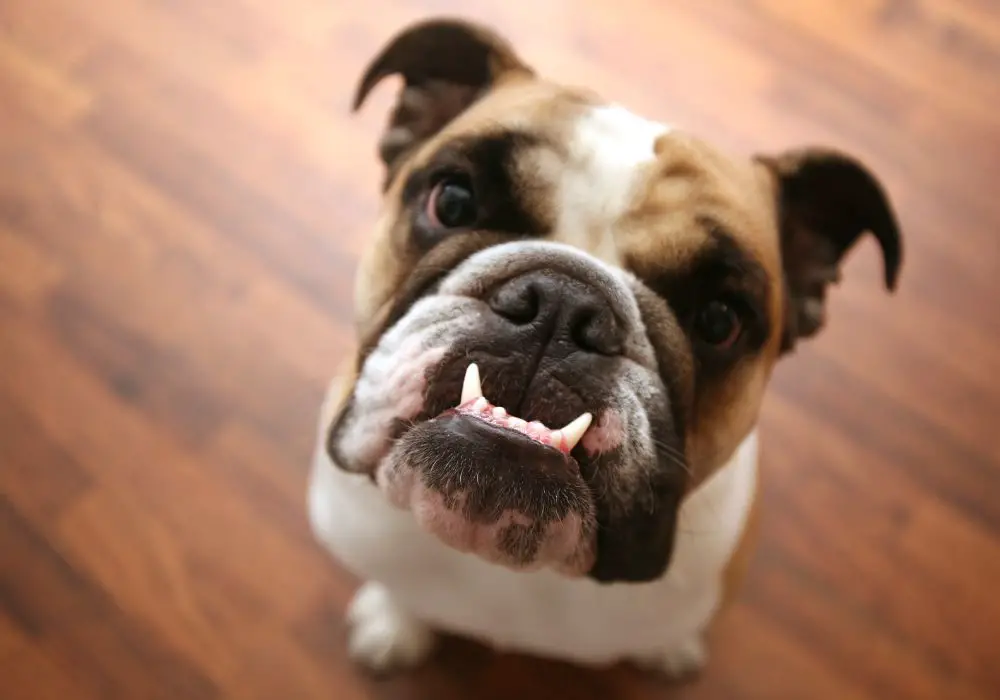
If your dog’s tooth grinding habit seems excessive or getting worse, your veterinarian can help determine if treatment is needed. Some ways vets and owners can help curb or reduce teeth grinding when necessary include:
Dental intervention
If underlying dental problems are causing pain prompting the grinding, your vet may prescribe special diets, antibiotics, antiseptic rinses, tooth extraction or surgery if needed. Regular dental cleanings under anesthesia are also important.
At-home options like brushing, water additives, or dental chews may also be helpful for maintaining oral health between veterinary cleanings. Reducing mouth pain minimizes the need to grind teeth.
Reducing anxiety and stress
For dogs that grind due to stress or excitement, focus on maintaining a calm environment and routine. Products like anxiety vests, pheromones, or medications can help highly anxious dogs learn to settle.
Counterconditioning using positive training helps teach dogs to associate stressful triggers with rewards. For example, giving high-value treats during car rides can reduce travel anxiety. Behavior modification therapy with a specialist is ideal for severe separation anxiety, noise phobias, or stranger reactivity exacerbating bruxism.
Providing outlets and diversions
Physical and mental stimulation through walks, playtime, puzzles, and training helps prevent boredom and work off a dog’s need to chew or grind. Rotate a variety of safe chew toys to give more productive chewing outlets.
Distracting with commands or toys when the dog starts grinding can break the habit and redirect to an activity incompatible with grinding. Praise and treats for calm, relaxed behavior teaches alternatives to grinding.
Discouraging habitual grinding
For dogs that grind out of habit, patiently interrupt or deter the behavior using verbal cues like “no grind” or briefly closing the mouth. Redirect to a toy or command they can succeed at. Consistency is key – it takes time and diligence to reshape habitual behaviors.
Medications
For severe muscle, nerve, or TMJ pain, muscle relaxants, pain relievers, anticonvulsants, sedatives, or antidepressants may provide relief under veterinary guidance. These reduce the pain feedback driving self-trauma from bruxism. Proper timing and dosage of medication is critical.
Dental mouthguards
Custom mouthguards created by vets using dental impressions can protect the teeth from damage during grinding, similar to nightguards for human bruxism. However, mouthguards just manage the symptoms rather than fixing the root cause.
So in summary, there are several approaches both at home and medically to help curb damaging teeth grinding based on the underlying cause and your dog’s unique circumstances. Your vet’s input is key in determining the best solutions. With patience and persistence, dogs’ bruxism habits can be minimized to improve their comfort and well-being.
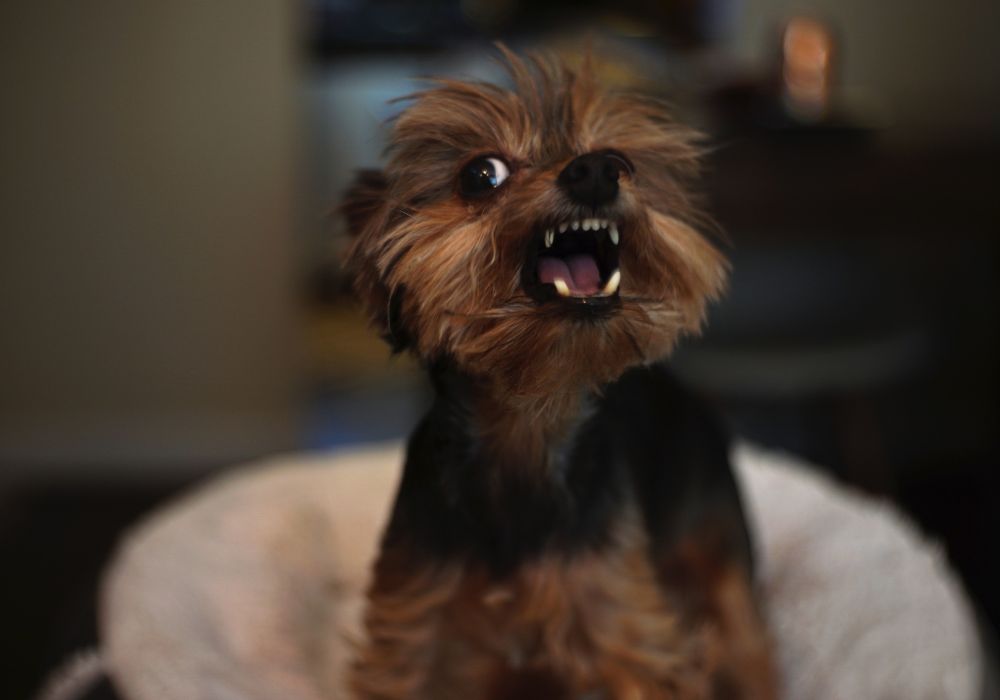
Frequently Asked Questions
Is teeth grinding normal in dogs?
Mild, occasional teeth grinding is quite normal in dogs and not considered problematic. However, excessive or forceful grinding to the point of damaging teeth, jaw muscles, or joints is abnormal and warrants medical attention. Vets examine grinding on a case-by-case basis.
When should I take my dog to the vet for grinding?
See your veterinarian promptly if tooth grinding is chronic, intense, loud, worsening, or accompanied by symptoms like mouth pain, tooth damage, drooling, bad breath, or mouth bleeding. Grinding alone may not require treatment, but vets need to determine if an underlying condition is causing it.
Can tooth grinding lead to tooth loss?
With years of severe grind habits, the chewing surfaces and eventually the tooth roots can wear down to the gumline. This progressive dental wear weakens the tooth anchoring and prompts tooth loss, usually starting with the premolars and molars. Annual dental cleanings and exams help detect worsening wear before it causes tooth loss.
What breeds grind their teeth the most?
Brachycephalic (short-nosed) breeds like Boxers, Bulldogs, and Boston Terriers are most prone to habitual, obsessive teeth grinding, likely due to their cramped jaws. However, any anxious, stressed, or bored dog may grind their teeth excessively without outlets. Small dogs’ grinding tends to be more noticeable and shrill.
Can bruxism in dogs be cured completely?
There is no cure, only management for canine bruxism. The goal is to reduce any underlying causes like dental pain or stress while providing alternative chewing outlets. Grinding may return if those factors recur. Consistency with at-home diversion tactics, dental care, exercise, and training helps minimize grinding long-term.
In summary
While teeth grinding is common in dogs, excessive or damaging bruxism warrants veterinary attention. Diagnostic tests help identify the underlying cause, whether it be dental pain, anxiety, seizures, or normal habitual behavior. Treatment focuses on addressing the root problem along with providing outlets and reducing teeth grinding damage. With time and patience, dogs’ bruxism habits can be reduced to improve their comfort and well-being.

